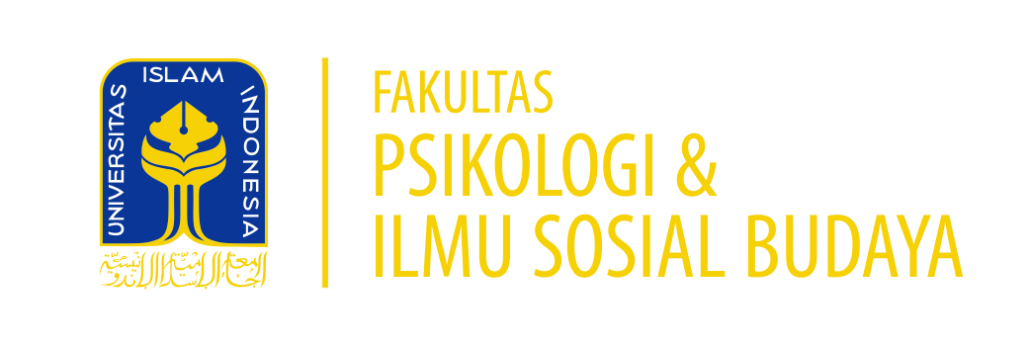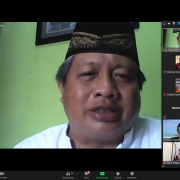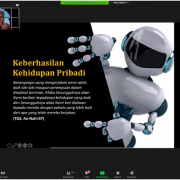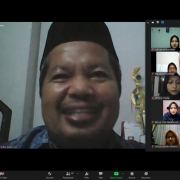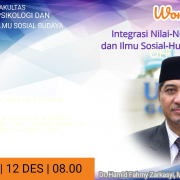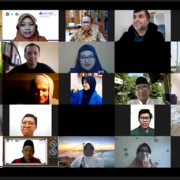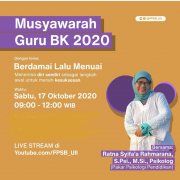Religiosity and Forgiveness
Oleh : Dr. H. Fuad Nashori, S.Psi., M.Si., M.Ag., Psikolog —-
Religious people are forgiving. That is what we believe. What about the findings of contemporary psychology on this issue?
So far, we believe that people who understand and (try) to practice Islam are people who are easy to forgive. They know Allah ‘Azza wa jalla is very forgiving and encourages forgiveness (al’ afwu, forgiveness). “Indeed, Allah is All-Merciful, Most Forgiving” (QS al-Hajj: 60). “Be forgiving and tell people to do what is good, and turn away from those who are ignorant” (QS al-A’raf: 199). There are about 33 other verses in the Koran that command forgiveness and because of that, Muslims would take the position of forgiveness if one day they are hurt based on their religious beliefs.
There is a cross-cultural study that links religiosity and forgiveness which supports the above view. This research does not specifically analyze forgiveness but seeks to portray some of the strengths of the characters of various ethnic groups in Indonesia (Nurwianti & Oriza, 2010). The research conducted on 1,066 people (540 men, 526 women) aged 18-55 in Javanese, Sundanese, Betawisese, Minangese, Batakese and Bugisese ethnic groups showed that the Minangese people had the highest forgiveness score compared to the other ethnic groups. another. I once asked the two researchers directly during a presentation at the International Conference on Indigenous and Cultural Psychology 2010 about what makes Minang people more forgiving? They replied, the Minangese people openly put religion as the foundation of their life. As is well known, one of the mottos believed by the Minangese community is the custom of basandi syara ‘, Kitabullah (Sharia-based custom and holy book-based Sharia). The holy book-in this case is al-Qur’an and al-Hadith-shows the command that the individual forgives others who do wrong.
Research with Muslim subjects has also been conducted. Nashori, Iskandar, Setiono, and Siswadi’s (2020) research involving 50 male and female students shows that religiosity is a factor that affects forgiveness. Some of the things that make a person able to forgive are the belief of Allah ‘Azza wa jalla as a source of strength that makes it easy to forgive, Allah’s attribute who is all-forgiving and removes sins, a view that unpleasant events are tests from Allah, good prejudice against Allah, forgiveness will make close to Allah, as well as religious guidance to forgive.
One of the important questions that can be asked is whether the influence of religiosity on forgiveness is direct or through a mediator?
Religiosity and Forgiveness: Is There a Mediator?
The contemporary positive psychologist, McCullough (2001), is one who voices the importance of the role of religiosity in forgiveness. Like most of us, he is of the view that religious values – in addition to cultural values – motivate many people to forgive. Even so, he argues that the effect of religiosity on forgiveness must go through a mediator called kindness and emotional stability. That is, being religious brings kindness to life (agreeableness trait) and emotional stability (emotional stability trait), which make it easy for individuals to forgive.
A study published in the same year (2001) turned out to show different results from McCullough’s. This study is the effect of religiosity on forgiveness of Catholics and Protestants. The results show that there is a direct effect, namely, religiosity has a direct effect on forgiveness. Research conducted by Krause and Ingersoll-Dayton (2001) on the elderly white and black Americans, amounting to 129 Catholics and Protestants, show that the religious elderly are easy to forgive. They believe God is all-forgiving and commands humans to give forgiveness to those who violate their rights.
I tried to research to answer whether religiosity, in this case, religious practice, influenced forgiveness. This study involved 109 male and female Muslim students in Yogyakarta. The results showed that the quality of dhikr – which is a form of worship or religious practice – has a direct influence on improving students’ ability to forgive. Recitation softens the heart, with a soft heart a person can easily empathize with others. Empathy, on the other hand, makes forgiveness easy (Nashori, 2005). The results of this research confirm that the practice of religion, in this case, zikr, makes it easy for someone to forgive. Why is that? The reasoning used is dhikr that leads people to be soft in the heart so that it makes it easier for them to forgive.
On the one hand, I believe the results of the research above. However, on the other hand, I also see the reality of people who do not forgive and even take revenge even though they understand and practice religious teachings. They are religious but hostile to other people, even people of their kind. I have read studies of people who commit violence in the name of their religion.
Not satisfied with that, I conducted several studies on whether religiosity has a direct or indirect effect on forgiveness. The research I conducted in Maduranese ethnicity shows that the effect of religiosity on forgiveness is indeed indirect and requires a mediator called agreeableness and emotional stability (Nashori et al, 2019). I obtained the same results when researching Javanese ethnicity Mancanegari subculture, Javanese who live in Surabaya, Malang, and Mojokerto (Nashori et al, 2020a), and Javanese ethnicity Negarigung subculture who live in Yogyakarta (Nashori et al, 2020b). Why is that? The reason is that being religious leads people to grow their good qualities and mature their emotions, making it easier for them to forgive. Religion encourages the growth of rahmatan lil alamin, which is love for anyone, regardless of religion, ethnicity, race.
Religiosity Enviates Compassion
Research related to religiosity and forgiveness was conducted by Webb, Chickering, Colburn, Heisler, and Call (2005). The research, which was conducted by 280 students of public universities and Christian universities, shows that there is a positive correlation between the concept of God who loves and forgiveness and there is a negative correlation between the concept of God controlling and forgiveness. In essence, if a person is dominated by the understanding that God loves humans, then they also develop feelings of love – or affection – towards others. Love for others is what makes it easier for them to forgive.
There is a relevant perspective. This appreciation of who God is ultimately leading someone to easily forgive or not. In looking at God, some view God with a Jamal perspective and some view God with a Jalal perspective. Included in the group of characteristics of jamal are Most Compassionate (ar-Rahman), Most Merciful (ar-Rahiim), Most Provider of Welfare (as-Salam), Most Forgiving (al-‘Afuw), Most Forgiving (al-Ghaffar), Most Forgiving (al-Ghafur), Most Extensive (al-Basith), Most Extensive (al-Wais’), Most Wise (al-Hakim), Most Glorifying (al-Mu’iz), Most Gentle (al-Lathif ), etc. Including the traits of jalal are Owner of Greatness (al-Jalal), Most Forcing (al-Qohhar), Most Ruling (al-Malik), Most Regulating (al-Muhaimin), Most Mighty (al-‘Aziz), Owner of Strength (al-Jabbar), Most Narrowing (al-Qabidh), Most Giving of Calculation (al-Hasib), Most Deadly (al-Mumitu), and so on. When a person sees God as having a stronger physical character, then people will be overwhelmed with compassion and that makes it easier for him to forgive. If someone views God as stronger in his jalal nature, then that person will be overwhelmed with assertiveness, courage, which makes him prefer to punish wrongs and uphold justice, so as not to put forgiveness as the main thing in life with other people.
In essence, let us follow Islam properly. When we become forgiving, people also become forgiving. Thereby.
The author is an Associate Professor in Islamic Psychology and Social Psychology at the Islamic University of Indonesia, Founder and Council of Experts of the Association of Islamic Psychology, Indonesia.
References
Krause, N. & Ingersoll-Dayton, B. (2001). Religion and The Process of Forgiveness in Late Life. Review of Religious Research, 42 (3), 252-276.
McCullough, M.E. (2001). Forgiveness: Who Does It and How Do They Do it? Current Directions in Psychological Science, 10 (6), 194-197.
Nashori, H. F. (2005). Hubungan Kualitas Dzikir dan Pemaafan pada Mahasiswa. Jurnal Psikologi (Undip), 9, 27-35.
Nashori, H.F, Iskandar, T.Z., Setiono, K., & Siswadi, A.G.P. (2011). Forgiveness among Muslim Student University. The Roles of Islamic Psychology in the Effort of Increasing Life Quality: Proceeding International Conference on Islamic Psychology and the Third of Congress of Association of Islamic Psychology. Malang: Faculty of Psychology State Islamic University Malang.
Nashori, H. F., Wijaya, H.E., Diana, R.R., & Herawati, N. (2019). Forgiveness Among Maduranese Ethnic: The Relation Between Religiosity, Interpersonal Attachment, and Personality Trait. Advanced Science Letters, 25 (1), 155-157.
Nashori, F., Gusniarti, U., Subandi, M.A., Diana, R.R., & Saputro, I. (2020a). Forgiveness among Javanese Ethnicity Mancanegari Subculture: A Case Study in Indonesia International. Journal of Psychosocial Rehabilitation, 24 (7), 8765-8776.
Nashori, F., Iskandar, T.Z., Setiono, K., Siswadi, Andriansyah, Y. (2020b). Religiosity, interpersonal attachment, and forgiveness among Javanese population. Mental Health, Religion, and Culture, 23 (2), 99-112.
Nurwianti, F. & Oriza, I.D. (2010). Explorative Study of Character Strengths on Indonesian People (Javanese, Sundanese, Minangese, Betawisese, Bugisese, and Batakese). Paper presented on The First International Conference of Indigenous and Cultural Psychology, Faculty of Psychology, Gadjah Mada University, July 24-27.
Tim Penerjemah Al-Qur’an dan Terjemahannya. (2012). Al-Qur’an dan Terjemahannya. Jakarta: Kementrian Agama RI.
Webb, M., Chickering, S.A., Colburn, T.A., Heisler, D. & Call, S. (2005). Religiosity and Dispositional Forgiveness. Review of Religious Research, 46 (4), 355-370.
